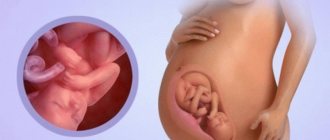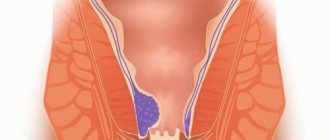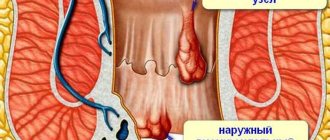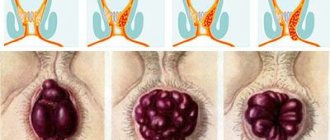One of the most common misfortunes that await a pregnant woman is hemorrhoids. According to statistics, problems with the functioning of the vessels of the rectum occur in about a quarter of all pregnant women, and among those who have just given birth, this figure doubles. The occurrence of the problem is facilitated by both lifestyle changes and the physiological characteristics of the body during gestation. What should be the treatment for hemorrhoids during pregnancy?
Causes of hemorrhoids during pregnancy
Hemorrhoids are varicose veins near the anus.
Hemorrhoids (from the Latin word "hemorrhoids" - "bleeding") are varicose veins near the anus. Hemorrhoids occur due to stagnation of blood and impaired blood flow; they cause not only physical and mental discomfort, but can also cause serious consequences.
Pregnant women are at risk for this disease due to changes that accompany fetal development. The uterus increases in size, occupying most of the abdominal cavity, and the intestines begin to compress. Blood vessels are pinched, blood flow worsens - as a result, blood stagnation begins and hemorrhoids form.
Another cause of the disease is changes in hormonal levels and the functioning of the nervous system. The muscles of the uterus and intestinal walls are regulated by a single mechanism, and tension in the intestines during bowel movements can provoke premature uterine activity. The body protects itself from this, but the consequence is problems with bowel movements.
Constipation becomes common in late pregnancy, so the pregnant woman will have to strictly control her bowel movements. During childbirth, intra-abdominal pressure actively increases, and the baby’s head compresses the intestinal veins during movement. This can lead to knots falling out and other unpleasant consequences. If a woman has not undergone treatment during pregnancy, hemorrhoids can cause many unpleasant complications.
Many women believe that since hemorrhoids occur for physiological reasons, this is normal and does not require treatment, but this is far from the case. It is important to consult a specialist as soon as possible, since negative consequences can significantly complicate childbirth and negatively affect not only the health of the mother, but also the baby.
Third stage
At the third stage of hemorrhoids during pregnancy, constant intense pain appears. Since the woman cannot take regular painkillers, painful sensations bother her day and night, preventing her from resting and going to the toilet freely. It becomes more and more difficult to lie down, sitting is simply unbearable.
With this development of hemorrhoids in pregnant women, the nodes begin to fall out by the 3rd trimester. The inflamed tissues can no longer go back on their own; efforts have to be made.
At the third stage, an urgent visit to a proctologist is required, who will determine how and how to treat hemorrhoids during pregnancy, taking into account the woman’s medical history and condition. It is absolutely impossible to ignore the disease and self-medicate - this threatens the child’s health.
Stages of hemorrhoids and its manifestations
Hemorrhoids in general are one of the most common diseases in the civilized world, and it is associated with a number of factors. Even young, nulliparous women may experience discomfort, and after the start of pregnancy the problem will manifest itself in its entirety. There are several stages of development of hemorrhoids, which can be determined by their external manifestations:
- The first stage is internal hemorrhoids, which begin to manifest as discomfort during bowel movements. An unpleasant itching occurs, a feeling of intestines that are not completely emptied, and later the woman notices blood stains on the toilet paper. This suggests that negative processes have already begun, and it is time to take action. However, most often at this stage a person does not consult a doctor, hoping that the negative symptoms will disappear on their own.
- The second stage is manifested by pain during bowel movements, which can no longer be ignored. Another important sign is prolapse of hemorrhoids. In addition, the disease is manifested by bleeding during bowel movements.
- The third stage is accompanied by prolapse of hemorrhoids, and this can occur with any physical activity. Patients try to straighten them with their hands, but this is not always possible. At this stage, surgical treatment in combination with other methods is often prescribed.
- With hemorrhoids of the fourth stage, the nodes can no longer be set on their own, and emergency medical care is required. If measures are not taken, the disease can lead to the formation of thrombosis and even malignant tumors. Pregnant women need to take action long before complications develop to prevent problems during childbirth.
It is important to understand that the first symptoms of hemorrhoids indicate the beginning of a pathological process that will not disappear on its own. The symptoms may subside for a while, but then they will definitely remind themselves, so treatment will still have to be carried out.
Symptoms of hemorrhoids
The main symptoms of hemorrhoids include: discharge of blood from the anus during defecation (admixture of scarlet blood, discharge of blood in the form of drops or streams), prolapse of internal hemorrhoids from the anal canal during defecation (appearance of a dense painful formation in the perianal area), the presence of enlarged external hemorrhoids nodes, itching and burning. The appearance of pain is usually associated with thrombosis of hemorrhoids or the appearance of an anal fissure. With the development of inflammatory complications of acute thrombosis of hemorrhoids with the transition of the inflammatory process to surrounding tissues and perirectal tissue, general inflammatory symptoms may appear, such as increased body temperature and fever.
During the gestational period, hemorrhoids can often be asymptomatic, but hemorrhoidal nodes are detected during rectal examination and anoscopy. Therefore, it is very important to consult a coloproctologist before planning a pregnancy. Timely identification of pregnant women with clinically asymptomatic hemorrhoids and the implementation of preventive measures in them makes it possible to prevent its development, which complicates the course of childbirth and the postpartum period.
Methods for preventing hemorrhoids in pregnant women
Proper nutrition and adherence to a daily routine are very important in the prevention of hemorrhoids.
Compliance with medical recommendations will prevent the development of the disease and avoid unpleasant consequences. Since pregnant women are initially at risk, the doctor will prescribe a whole range of measures that will prevent the development of the disease. If discomfort occurs, it is necessary to undergo an examination; based on the results, a diagnosis will be made and treatment will be prescribed. There are several main areas of prevention:
- Proper nutrition and adherence to a daily routine. Pregnant women need to include plenty of fruits and vegetables in their diet, as well as cereals to prevent constipation. It is necessary to limit spicy and fatty foods, spicy seasonings as much as possible; carbonated drinks and alcohol are completely excluded from the diet. All this contributes to normal bowel function and prevents the development of hemorrhoids.
- Therapeutic exercise plays a big role in ensuring normal blood flow in the pelvic organs. Even simple hygienic exercises in the morning help prevent stagnation of blood in the veins, thereby reducing the risk of hemorrhoids. The doctor will select the necessary exercises, and you will have to perform them during the entire waiting period. Therapeutic exercise should not overload the body; a reasonable approach and a sense of proportion are important.
- Strict adherence to personal hygiene rules is important. It is necessary to rinse with cool water after bowel movements, in addition, ascending irrigation of the anal area will be useful. To do this, simply turn the shower so that its jets are directed upward.
- It is necessary to avoid hypothermia, which can also lead to various problems. Women in general, and pregnant women in particular, should not sit on a cold surface; during the months of expecting a baby, it is better to avoid long journeys on foot and heavy physical exertion.
Preventive measures can also be prescribed after diagnosis in combination with medications.
Complex therapy allows you to achieve good results and get rid of unpleasant symptoms for a long time.
Is it possible to use folk remedies?
Folk remedies are not always effective in the fight against hemorrhoids.
In folk medicine, there are dozens of recipes for hemorrhoids, but not all of them are effective, and not all can be used during pregnancy. Before using any decoctions and tinctures, you should consult a specialist: treatment with “harmless” herbs can lead to serious health problems if contraindications are not taken into account or the dosage is calculated incorrectly.
A generally accepted folk remedy is lungwort decoction: a spoonful of plant material is brewed with a glass of boiling water, the cooled decoction is taken a tablespoon in the morning, lunchtime and evening. Sitz baths with chamomile flowers and plantain leaves will be useful.
However, any herbs can be used only if there are no allergies, and they can only be purchased at a pharmacy. Self-collection must be carried out in compliance with a number of requirements, so you should not trust medicinal raw materials from unverified places. Treatment of hemorrhoids should be carried out in a complex under the constant supervision of specialists. This will help you get rid of symptoms and give birth to a healthy baby without any problems.
Fourth stage
Hemorrhoids during pregnancy at the fourth stage are a very advanced disease that can no longer be treated with medication. Only surgery will help relieve the symptoms.
Hemorrhoids are removed on the operating table. Doctors are trying to find the most non-traumatic ways to remove inflamed tissue, but this still becomes a strong stress for the body of a pregnant woman.
The last stage of hemorrhoids during pregnancy rarely develops in the 2nd trimester; more often it occurs at the end of gestation if the pathology is not treated. It is accompanied by severe pain, bleeding, thrombosis, necrosis and other extremely undesirable consequences.
Fortunately, hemorrhoids in pregnant women in such an advanced form are rather an exception. If the expectant mother begins to regularly see a doctor and reports any changes in her health, then the problem can be diagnosed in the early stages. Timely treatment allows you to defeat the disease with the help of drugs that will not harm the baby. And if hemorrhoids just begin during the 3rd trimester of pregnancy, then they simply will not have time to reach this stage. The only exceptions are women who become pregnant while already having the disease in a highly progressive form. Therefore, it is so important to eliminate all health problems before conceiving.










